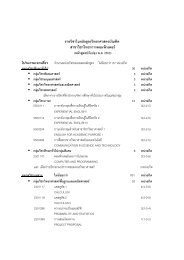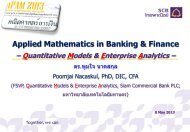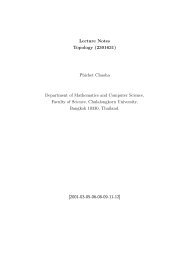2301490 SEMINAR Abstract Outline
2301490 SEMINAR Abstract Outline
2301490 SEMINAR Abstract Outline
Create successful ePaper yourself
Turn your PDF publications into a flip-book with our unique Google optimized e-Paper software.
Lemma3<br />
Lemma4<br />
Lemma5<br />
Theorem2<br />
: If f is bounded on : {a ≤ x ≤ b} , and c is an intermediate point,<br />
<br />
then ∫ f(x)dx<br />
<br />
and<br />
<br />
∫ f(x)dx<br />
<br />
<br />
= ∫ f(x)dx<br />
<br />
<br />
= ∫ f(x)dx<br />
<br />
<br />
+ ∫ f(x)dx<br />
<br />
<br />
+ ∫ f(x)dx<br />
<br />
: Suppose that f is bounded on I: {a ≤ x ≤ b}<br />
Let F and G be defined on I by<br />
<br />
<br />
F(x) ≡ ∫ f(t)dt and G(x) =<br />
<br />
∫ f(t)dt , {a < x ≤ b} , and F(a)=G(a)=0.<br />
<br />
Then F'(x )=G'(x )=f (x ) at each point x of I at which f is continuous.<br />
(At a and b, the derivatives are of course one-sided )<br />
: If a, b ∈ R such that |a − b| ≤ ε for all ε > 0, then a=b<br />
: If f: [a, b] → R is bounded, and continuous except on a set of measure zero, then f is Riemann<br />
integrable on [a, b]





